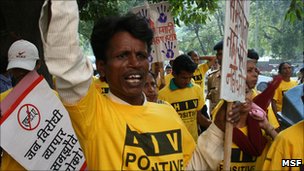MSF launches attack on European Commission for blocking cheap drugs
The Guardian | 7 October 2010
MSF launches attack on European Commission for blocking cheap drugs

Sarah Boseley
In 2001, with the signing of the Doha declaration, it was widely thought that the battle for cheap drugs for developing countries had been won. The declaration effectively created a benign loophole in the medicine patent rules. Indian and other generics companies could be licensed to make cheap copies of patented HIV and other drugs to sell to poor countries.
But it’s not all over, by any means, according to campaigners for access to medicines. The foremost NGO among them, Médecins Sans Frontières, is today accusing the European Commission of aggressively pushing policies - including a trade agreement with India - that will dry up the flow of cheap drugs to those who badly need them in poor countries.
A three-month campaign, called "Europe! HANDS OFF our medicine", launched today, invites people to let the EC know they object through a web platform which allows them to send an email to the Trade Commissioner, Karel De Gucht. "If you continue to pursue your actions, people who rely on these medicines to stay alive will be left without a lifeline and many are likely to die," it says.
Tough language, but MSF believes the stakes are high and argues that the EC has been doing the bidding of the multinational drug companies (who want to protect their drug monopolies) for some time and in a number of ways. This is Dr Unni Karunakara, president of MSF’s international council:
We depend on access to affordable medicines like those produced in India to treat all kinds of diseases. We buy 80% of our Aids medicines from India - medicines that keep 160,000 people alive today. On their behalf, we cannot remain silent as Europe works to close the door on every aspect of drug supply - the production of a generic medicine, its registration and its transportation to patients in other parts of the world. So today we are launching a campaign demanding ’Europe! HANDS OFF our medicine.’
There are several issues. The free trade agreement is seeking tougher patent rules than the existing World Trade Organisation agreement requires, says MSF. The EC wants to introduce "data exclusivity", which would stop a generic company registering a copy of a drug that does NOT have a patent for a period of time - usually five to eight years - unless it runs its own expensive and lengthy clinical trials. At best, it would delay the arrival of generic versions.
MSF offers the example of nevirapine syrup for children with HIV. It was not given a patent by the Indian patent office, which meant generics companies could go ahead and copy it. If data exclusivity had been in force, children in Africa might have had to wait for some years.
But the campaigners also take issue with the EC over a number of seizures of generic drugs that have taken place in European ports since 2008. Dutch customs officers detained a shipment of losartan potassium, for instance, which is an ingredient in a blood pressure drug and was on its way from India to Brazil. It is not patented in either country, but it is in the Netherlands. The shipment was sent back to India. The Brazilian government said 300,000 Brazilian patients were waiting for their medicine. Aids drugs intended for Nigeria, bought by the European-funded access to medicines organisation UNITAID, were also seized in the Netherlands.
Michelle Childs, policy advisor for MSF’s access campaign, says the EC is doing the pharmaceutical’s industry bidding. "The IFPMA [the trade body] has said they want data exclusivity. They have repeatedly asked for this. It’s been a long-standing aim of the pharmaceutical companies to introduce this because it gives them the extra period of time."
The Office of the EU Trade Commissioner denied it was impeding access to medicines for the poor. This was what its spokesman told the BBC:
The EU has never and will never stand in the way of the production of legitimate generic medicines. The EU is in favour of providing access to medicines to people in need and these negotiations with India do not stand in the way of this.Patents are important, they need to be protected. The European pharmaceutical companies say that the patents need to be protected otherwise the production of new drugs will be seriously in peril.
MSF points out that the issue is not about patents.





